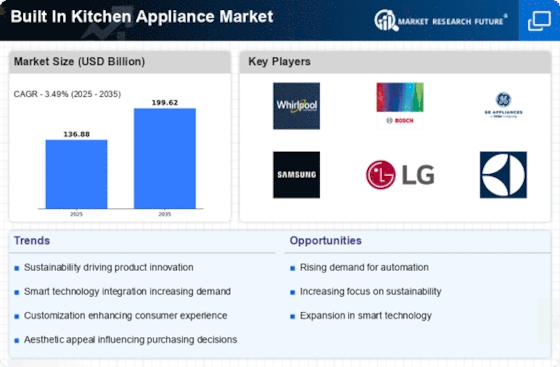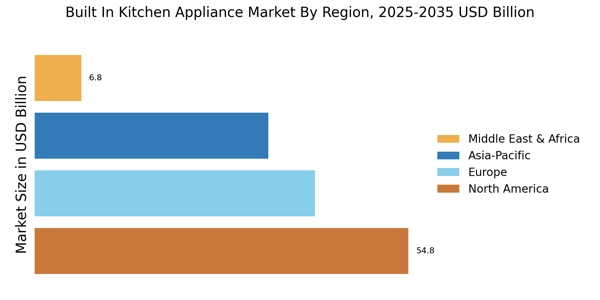Focus on Health and Wellness Trends
Health and wellness trends are significantly influencing the built in kitchen appliance Market. As consumers become more health-conscious, there is a growing demand for appliances that support healthier cooking methods, such as steam ovens and air fryers. These appliances allow for the preparation of nutritious meals with less fat and fewer calories. Market Research Future indicates that the health-oriented appliance segment is expanding, as consumers seek to improve their dietary habits. This trend is prompting manufacturers to develop innovative products that cater to health-conscious consumers, thereby shaping the future landscape of the Built In Kitchen Appliance Market.
Rising Demand for Energy Efficiency
The Built In Kitchen Appliance Market is experiencing a notable shift towards energy-efficient appliances. Consumers are increasingly prioritizing sustainability, leading to a surge in demand for products that minimize energy consumption. According to recent data, energy-efficient appliances can reduce energy use by up to 30% compared to traditional models. This trend is not only driven by environmental concerns but also by the potential for cost savings on utility bills. Manufacturers are responding by innovating and incorporating advanced technologies that enhance energy efficiency. As a result, the Built In Kitchen Appliance Market is likely to see a continued rise in the adoption of energy-efficient products, which may further influence consumer purchasing decisions.
Consumer Preference for Premium Products
The Built In Kitchen Appliance Market is witnessing a shift in consumer preferences towards premium and high-end products. As disposable incomes rise, consumers are increasingly willing to invest in high-quality appliances that offer superior performance and durability. This trend is reflected in market data, which shows that the premium segment is growing at a faster rate than the overall market. Consumers are not only looking for functionality but also for aesthetics and brand reputation. This inclination towards premium products is prompting manufacturers to enhance their offerings, thereby driving innovation and competition within the Built In Kitchen Appliance Market.
Increasing Urbanization and Space Constraints
Urbanization is a driving force behind the growth of the Built In Kitchen Appliance Market. As more individuals move to urban areas, the demand for space-efficient kitchen solutions rises. Built-in appliances are particularly attractive in smaller living spaces, as they maximize functionality without compromising aesthetics. Data suggests that urban populations are expected to increase, leading to a higher demand for compact and multifunctional kitchen appliances. This trend indicates that manufacturers must focus on creating innovative designs that cater to the needs of urban dwellers. Consequently, the Built In Kitchen Appliance Market is likely to benefit from this shift towards space-saving solutions.
Technological Advancements in Kitchen Appliances
Technological innovation plays a pivotal role in shaping the Built In Kitchen Appliance Market. The integration of smart technologies, such as IoT connectivity and automation, is transforming how consumers interact with their kitchen appliances. For instance, smart ovens and refrigerators can now be controlled remotely, offering convenience and efficiency. Market data indicates that the smart appliance segment is projected to grow significantly, with an expected compound annual growth rate of over 20% in the coming years. This technological evolution not only enhances user experience but also aligns with the growing trend of home automation, making the Built In Kitchen Appliance Market more appealing to tech-savvy consumers.


















